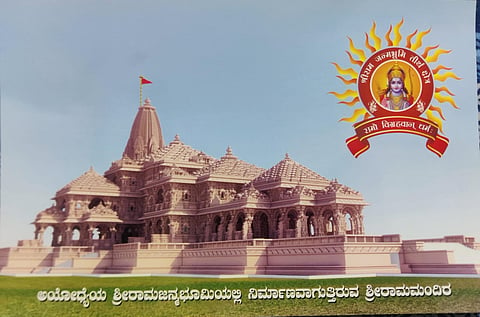

The Vishva Hindu Parishad's (VHP) "Akshate Invitation Maha campaign" in Bengaluru ahead of the Ayodhya Ram temple inauguration on January 22 has sparked discomfort among residents. The campaign involves VHP workers and Ram devotees distributing akshate (holy rice) and a pamphlet with instructions on how to celebrate the event, but reports of forceful entry and pressure to perform pooja rituals have raised concerns.
Several residents in the south Bengaluru area shared experiences of VHP members, sometimes in saffron shawls, insisting on entering their homes to perform pooja in their private spaces and place the invitation and akshate. One resident recounted how his daughter refused entry, while another expressed unease over a similar encounter when alone. The practice of uninvited entry and viewing prayer rooms has left some questioning the appropriateness and intrusiveness of the campaign.
"I am 63 years old and have never seen anything like this where any community insists on entering our homes," said a resident of Vikasipura. "How can they insist on coming into our homes and seeing pooja rooms? Wherever the temple is being built isn't our concern. Going door to door is wrong,” he added.
"It felt intrusive," shared a resident of Kumaraswamy Layout. "They insisted on coming inside and seeing my pooja room. I understand their enthusiasm, but entering someone's home without prior permission is inappropriate."
Another resident of JP Nagar said that two women and three men, clad in saffron shawls, arrived at her apartment unannounced and insisted on entering. Feeling pressured, she allowed them in. Once inside, they applied kumkum (a red vermillion powder) to her forehead and presented her with a flyer with a picture of the Ram temple.
A spokesperson from the VHP defended the campaign, stating that it aims to spread the message sent through the Sri Ram Janmabhoomi Kshetra Trust. The VHP is urging people to celebrate January 22, akin to Deepavali, encouraging the lighting of lamps in their houses. “The invitations, along with akshate (whole grains of rice and turmeric powder) and a set of instructions are being distributed nationwide,” he said.
Girish Bharadwaj, a VHP activist, told TNM that the ongoing campaign has garnered positive responses from thousands of individuals throughout Karnataka. Bharadwaj said that in northern Karnataka, people are embracing the distribution of akshate along with aartis as a gesture to welcome Lord Ram into their homes. He added that the campaign's objective is to ensure that those who played a role in the Ram Mandir movement feel included.
Addressing concerns about VHP’s unwelcome visits in Bengaluru, he said, “Activists distribute akshate and occasionally take pictures, possibly insisting on seeing prayer rooms for photographic purposes. However, overall, the campaign has been warmly welcomed, with people sharing their akshate moments online.”
The distributed instructions, endorsed by Sri Ram Janmabhoomi Tirthakshetra, urge people to organise local programs, watch the live telecast, and engage in devotional activities to mark the occasion. The instructions include watching the live telecast of the Ayodhya ceremony, accompanied by bhajans, kirtans, pujas, and aartis dedicated to various deities. It also urges people to mass chant ‘Sri Rama Jayarama’ 108 times along with recitations of Hanuman Chalisa.
“On the evening of the inauguration day, devotees are encouraged to light lamps in front of their homes, symbolising a global deepotsava (light festival) to appease gods and goddesses,” it read. However, the instructions explicitly mention that there will be no processions, public events, or bursting of firecrackers allowed on the inauguration day.
The inauguration of the Ram temple in Ayodhya, scheduled for January 22, is a major event attended by Prime Minister Narendra Modi and Uttar Pradesh Chief Minister Yogi Adityanath along with leaders from various political parties.
Right-wing groups in several states have announced plans to provide special assistance to devotees who plan to visit the temple after its consecration. These arrangements include transportation, accommodation, and food services.
Babri Masjid, built by Mir Baqi, commander of Mughal emperor Babur in 1528, was demolished by kar sevaks belonging to Hindu majoritarian outfits on December 6, 1992. The demolition, which happened as a result of a concerted Ram Janmabhoomi movement, resulted in communal riots over months, which led to over 2,000 deaths. The Babri Masjid has been a contested site since 1885 as religious leaders and Hindutva outfits considered it Ram Janambhoomi or the birthplace of Lord Ram in Ayodhya.
A legal fight ensued in 1950 when Gopal Visharad Sharma approached Faizabad district court for the right to worship idols of Ram Lalla, which were placed there in 1949. On September 30, 2010, the High Court, in a 2:1 majority, ruled a three-way division of the disputed area between the Sunni Waqf Board, the Nirmohi Akhara and Ram Lalla.
Nine years later, in 2019, the Supreme Court granted the entire 2.77 acres of disputed land to deity Ram Lalla and directed the Uttar Pradesh government to allot five acres of land to Muslims for building a mosque. Though the Supreme Court referred to the mosque's demolition as "an egregious violation of the rule of law," the verdict was criticised for accepting the logic of "faith over fact" and granting legal possession of land to those responsible for the demolition.